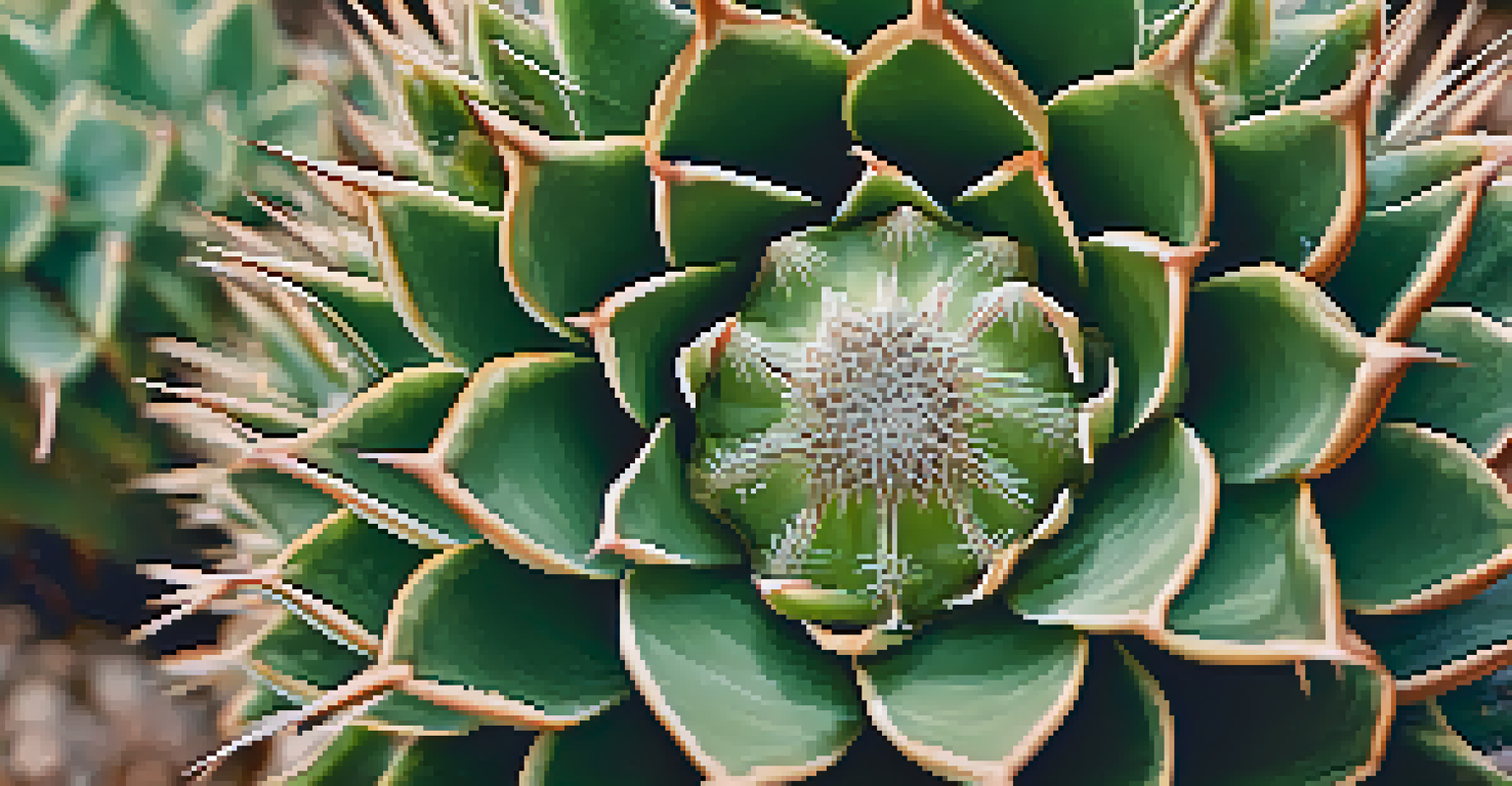Peyote, Consciousness, and the Quest for Spiritual Awakening

Understanding Peyote: A Brief Overview
Peyote is a small, spineless cactus native to Mexico and the southwestern United States. Known scientifically as Lophophora williamsii, it has been used for centuries by Indigenous peoples for its psychoactive properties. The cactus contains mescaline, a substance that alters perception and can lead to profound spiritual experiences.
In the world of psychedelics, the experience is not just an escape; it’s a journey into the depths of one's consciousness and the vastness of existence.
Traditionally, peyote has been utilized in religious ceremonies, serving as a tool for healing and introspection. Participants often report enhanced sensory perceptions, vivid visualizations, and deep emotional insights. This connection to spirituality is a significant aspect of its cultural importance.
With growing interest in psychedelics for personal and spiritual growth, peyote is gaining attention beyond its traditional use. However, it's essential to approach it with respect and understanding of its cultural significance, as well as the potential risks involved.
The Role of Consciousness in Spiritual Awakening
Consciousness is the state of being aware of and able to think about one's own existence and surroundings. It's a complex concept that encompasses our thoughts, feelings, and perceptions. Many spiritual traditions emphasize the importance of expanding consciousness as a pathway to awakening.

Through practices like meditation, mindfulness, and yes, even the use of peyote, individuals can explore different levels of consciousness. These explorations often lead to profound realizations about oneself and the universe. The quest for spiritual awakening often involves shedding limiting beliefs and understanding deeper truths.
Peyote's Spiritual and Cultural Role
Peyote is a sacred cactus used in Indigenous ceremonies for spiritual growth and healing, emphasizing its cultural significance.
As people seek to enhance their consciousness, they may experience shifts in perspective that foster personal growth. This journey can be both enlightening and challenging, requiring patience and openness to new experiences.
Psychedelics and Their Impact on Mental Health
Psychedelics like peyote have garnered attention in recent years for their potential therapeutic benefits. Research suggests that they can help alleviate symptoms of anxiety, depression, and PTSD by enabling users to confront and process their emotions. This aspect is particularly appealing to those on a spiritual journey.
The use of peyote is not merely a cultural act; it is a profound spiritual journey that connects us to the universe and our ancestors.
The experience of using peyote can catalyze personal insights and emotional healing. Users often describe a sense of interconnectedness with the world around them, which can lead to a greater appreciation for life. This shift in perspective is a crucial element of many spiritual awakenings.
However, it's essential to approach psychedelics cautiously and with informed guidance. Not every experience is positive, and individuals should consider their mental health history before embarking on such journeys.
Cultural Significance of Peyote in Indigenous Traditions
For many Indigenous cultures, peyote is more than just a plant; it's a sacred teacher. The use of peyote in ceremonies is seen as a way to connect with the spiritual world and gain insights from ancestors. These rituals often involve communal participation, which enhances the sense of community and shared experience.
The ceremonies typically include prayers, songs, and storytelling, all of which are integral to the spiritual process. Participants may enter altered states of consciousness that allow them to gain clarity on personal issues or broader societal concerns. This collective aspect reinforces the notion that spiritual awakening is often a shared journey.
Psychedelics and Mental Health Benefits
Research suggests that psychedelics like peyote can aid in alleviating mental health issues by facilitating emotional processing and personal insights.
As interest in peyote grows outside Indigenous communities, it's crucial to honor and respect its origins. Cultural appropriation can dilute the significance of these traditions, so understanding the context is vital for anyone seeking spiritual experiences with peyote.
The Science Behind Peyote and Mescaline
Mescaline, the active compound in peyote, affects the brain's serotonin receptors, leading to altered perceptions and experiences. This interaction can result in visual hallucinations, changes in time perception, and heightened emotions. Understanding the science behind these effects can demystify the peyote experience for newcomers.
Research into psychedelics is expanding, shedding light on how substances like mescaline can facilitate meaningful experiences. Scientists are exploring how these compounds can promote neuroplasticity, the brain's ability to form new connections. This aspect is particularly relevant for those seeking personal transformation.
While the science is promising, it's essential to consider the individual variability in responses to peyote. Factors such as mindset, environment, and personal background play significant roles in shaping the experience, highlighting the importance of a supportive setting.
Navigating the Ethical Considerations of Peyote Use
As the popularity of peyote grows, ethical considerations come to the forefront. It's vital to engage with peyote respectfully and responsibly, especially given its sacred status in Indigenous cultures. This includes understanding the implications of harvesting and using peyote and recognizing the rights of Indigenous peoples.
Being mindful of the environmental impact of peyote harvesting is also crucial. Overharvesting can threaten the species and disrupt ecosystems. Ethical use means ensuring that the practice is sustainable and that communities who have historically used peyote are honored and supported.
Ethical Use and Respect for Traditions
Engaging with peyote ethically requires understanding its cultural roots and ensuring sustainable practices to honor Indigenous traditions.
Ultimately, ethical engagement fosters a deeper connection to the experience and its roots in culture and spirituality. Those seeking spiritual growth through peyote should prioritize learning and respect over mere experimentation.
Personal Stories: Transformative Peyote Experiences
Many individuals who have participated in peyote ceremonies recount transformative experiences that have profoundly affected their lives. These stories often highlight themes of self-discovery, healing, and interconnectedness. By sharing these narratives, we can better understand the potential of peyote as a tool for spiritual awakening.
For instance, a person might describe a ceremony where they confronted deep-seated fears or traumas, emerging with a renewed sense of purpose and clarity. Others may report feeling a sense of unity with nature and a desire to advocate for environmental causes. These personal revelations often serve as powerful motivators for change.

While each experience is unique, the common thread is a sense of awakening that encourages individuals to live more authentically. These stories remind us of the potential for growth and transformation that lies within each of us, waiting to be uncovered.